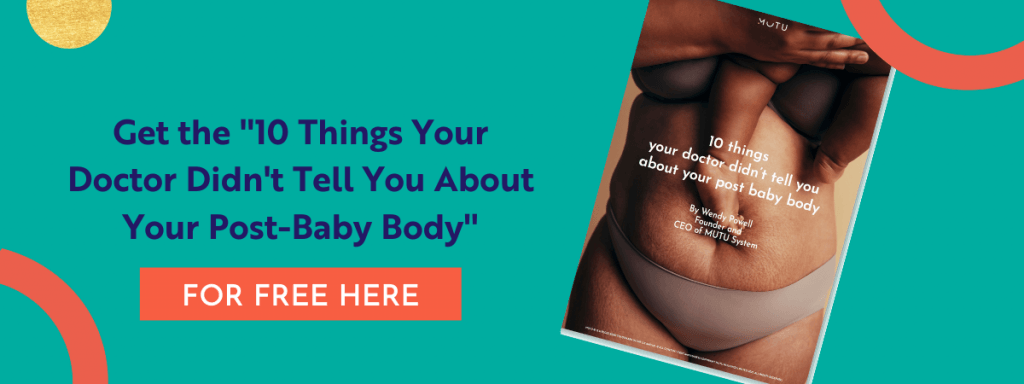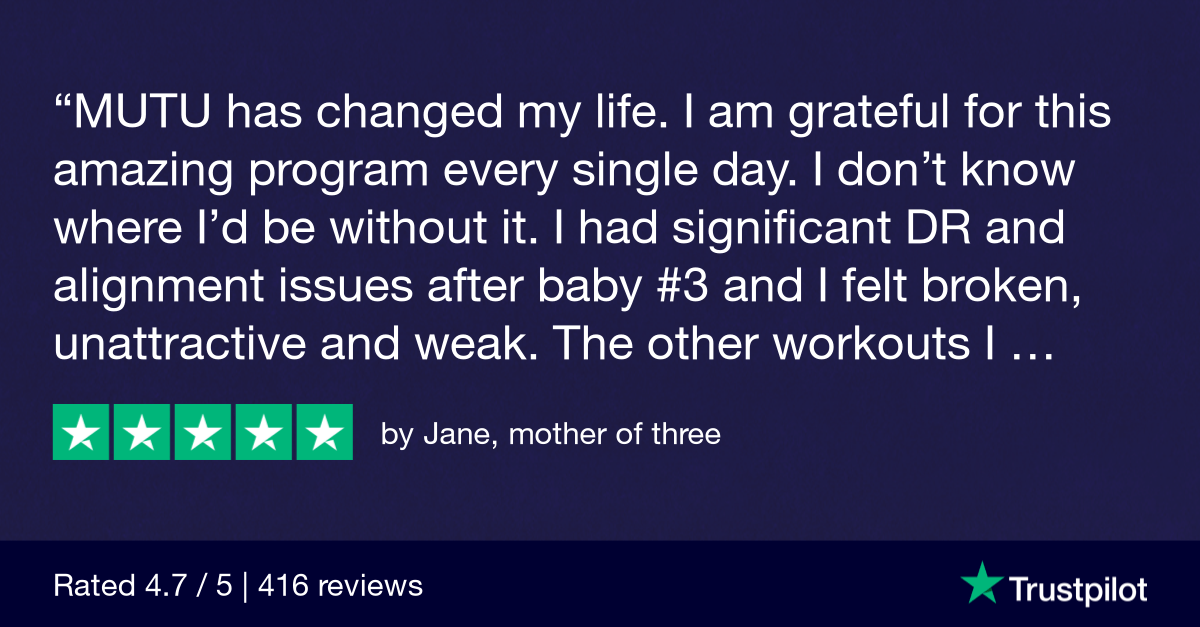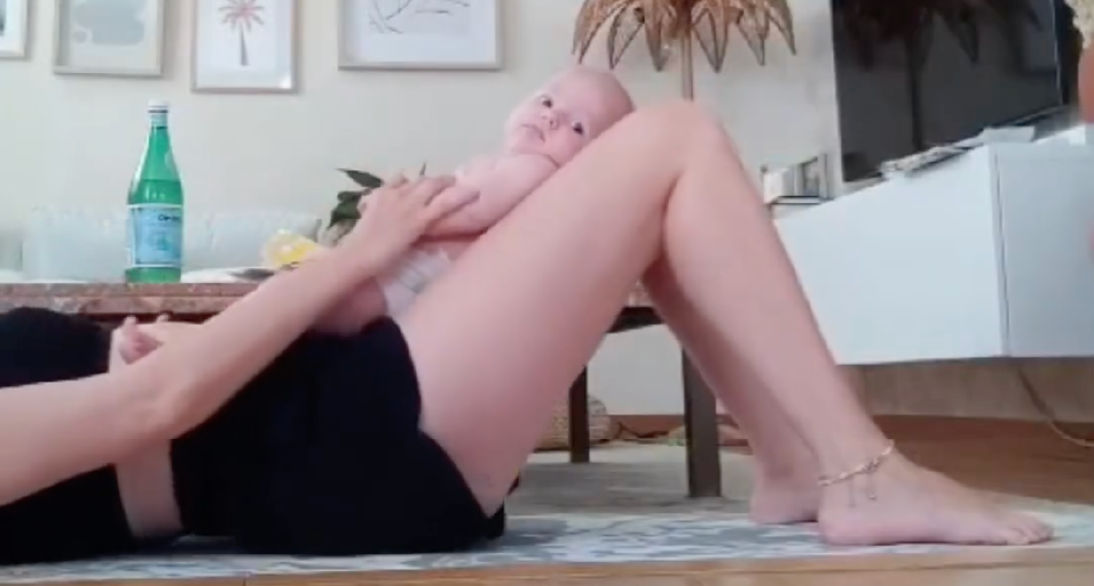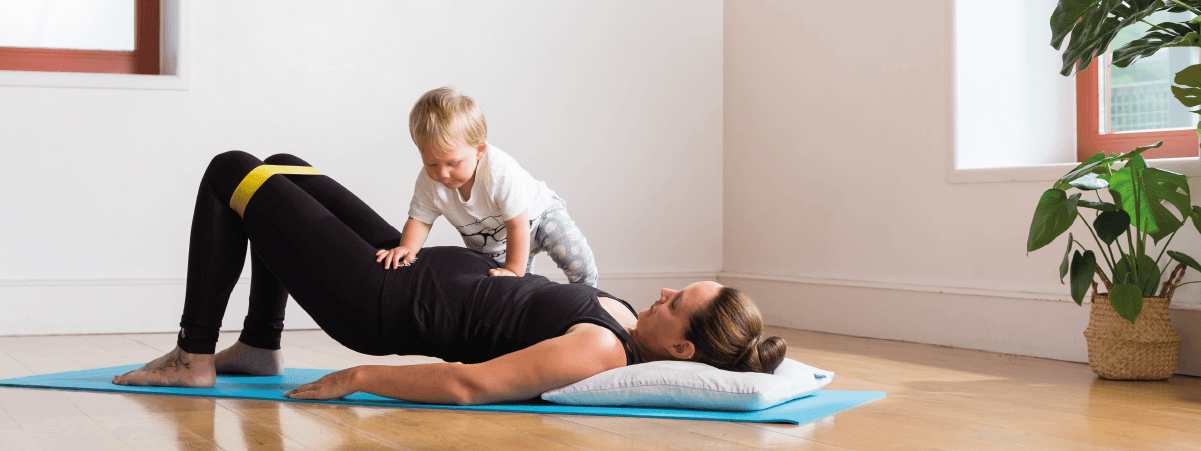It’s never too late to strengthen your core function, heal diastasis recti and improve the stability of your abdominal muscles.
One of the most common questions we’re asked is how to fix diastasis recti years later. Many moms think they’ve left it too late to make a difference and worry that nothing can be done . If that sounds like you, don’t worry, the short answer to, ‘Can I heal years later? is “Yes!”
You can always improve your core function, tension and the stability of your abdominal muscles. However long ago you had your baby. The truth is we never stop being postpartum, so why put an expiry date on your recovery period?
Your ab muscles are all still there, but they have shifted and been put under extreme tension and load. If you have diastasis recti the muscles have separated. It’s never too late to improve core strength and minimise diastasis, but some of the more traditional ab exercises you’re used to, aren’t necessarily where to start.
How to fix diastasis recti years later
Focus on posture and deep core work
Posture and deep core work are central to healing diastasis recti, regardless of how long ago you had your babies.
Diastasis recti symptoms can present themselves in a number of ways, including a pregnant-looking tummy, back pain, urine leakage, pelvic prolapse, painful sex or just general difficulty performing everyday tasks like lifting and walking.
A recent 2021 study showed that 33% of women still experience diastasis recti at 12 months postpartum (as well as many cases persisting much later in life).
So it’s clear that treating diastasis recti, even years later, is a real priority.
The good news is however many years ago you had your babies, adjustments to the way you sit, stand and walk will affect how your core muscles work, and how your tummy looks.
If you have diastasis recti, the layers of abdominal muscles have drawn apart, and the connective tissue between them is thinner and stretched.
By working on foundational healing, reconnection, and strengthening of your deep core muscles, and making some postural adjustments, you can significantly improve the appearance and function of a diastasis recti.

Think in terms of healing (and not ‘fixing’)
The goal is stability and strength. There’s nothing broken to fix.
The two halves of your rectus muscle were never fused, and there was always some ‘gap’. All of us have rectus ab muscles, in two halves, joined by connective tissue – the linea alba.
It is this connective tissue that stretches and weakens, widening the gap down the midline between the breastbone and pubic bone. It’s not broken or torn, so there’s nothing broken to fix (unless you have a hernia, which is different from diastasis recti).
The goal is to reduce the gap, or to treat/improve the width of the gap. However, the real goal is stability and strength. And you can still have that with a gap remaining – this is a functional diastasis.
A postural alignment cheat sheet (for healing diastasis recti)
Healing, connecting and strengthening your deep core muscles and pelvic floor system will improve a diastasis recti. Whether it’s 1 year, 5 years or 20 years after you had your baby.
We go into posture and alignment and our top diastasis recti exercises in detail in our MUTU program but here’s our 3 biggest tips:
- Try not to thrust out your chest or tuck (flatten) your backside
- Walk more, sit less and change position more
- Focus on your glutes and a strong core.
Follow these steps to help you tweak and adjust your alignment.
Poor alignment and posture can mean uncontained pressure and loading. That’s a technical way of saying your core muscles are not in the correct position to work optimally.

Will my diastasis recti get worse with age?
Age is not relevant. A diastasis will worsen if you continue to move and load your body in a way that increases pressure on the gap.
If you don’t take steps to heal your diastasis, it will likely stay, possibly leading to a lack of optimal core strength and stability.
This could potentially result in back pain, and also aesthetically, many women don’t like it as the tummy protrudes more.
Learn how to check for Diastasis Recti.
Real-life stories from mamas who healed their diastasis recti years after giving birth
Still looking for inspiration to start healing years later? Hear from our customers.
We’ve got Mamas getting great results in the MUTU System program, whose children are now in their 20s and 30s and have long since flown the nest.
They discovered, years after giving birth, searching for answers, and almost giving up completely, that they don’t need to put up with unwanted symptoms anymore.
My youngest baby was 32 last December! I’m a grandma 3 times over and I’m 62 and I’m 4.5 weeks into MUTU… My tummy is definitely shrinking and I only wish I had had this program when I was first a mommy in 1980! To say I have left this a bit late is something of an understatement, however, I don’t believe it is too late. I don’t believe it is ever too late for anything
Fiona, a MUTU mama and grandmama. Read Fiona’s story here.
How MUTU can help you recover
MUTU is a postpartum exercise and wellness program for moms at any and every stage of motherhood.
Healing, connecting and strengthening your deep core muscles and pelvic floor system will improve a diastasis recti.
Even years after you had your baby. Find out more about choosing the right postpartum programme for you.

Hospital trials show MUTU System is highly effective for helping with diastasis recti
In Hospital Trials in 2020, 94% of women with diastasis recti (separation of abdominal muscles) reported an improvement after using the MUTU System.
It doesn’t matter how long ago you had your baby; the award-winning, medically recommended MUTU program can help.
Notes: This article was originally published May 17, 2021, and most recently updated December 2nd, 2022.
No content on this website, regardless of date, should be used as a substitute for medical advice from your healthcare provider.










After 1 singleton birth then twins 14 months later, my body has never been the same. My children are 33 and 32 now. I came across the Mutu System link tonight and decided I have nothing to loose!
Everything makes sense with this program and it’s information no one readily makes available. Although I know the symptoms, I never heard about DR until tonight.
Just joined and praying this is the beginning of a beautiful journey to better health!
Lynda
We’re so glad that you found MUTU and look forward to helping you on your healing journey. Don’t forget to login to Connect and say hi to our lovely Mama’s and Nicole x
Happy to come across this. I hope to achieve some successes
So happy you have joined us, please let us know how you get on with the program
I am also suffering from it.i have 5 years older son
Some examples of a daily workout please
Want to learn more
I am a mother of three young children, youngest 3 months. I have a large and deep separation. How can your program help?
Hi Sam, No exercise routine can or should guarantee to ‘treat’ or ‘fix’ every situation. A focused postpartum core restoration program will benefit your “abdominal muscles and pelvic floor greatly, even where surgery is deemed necessary. Remember that diastasis recti is a result of inappropriate or ineffective loading on a compromised and weakened core, and of excessive intra abdominal pressure. The benefits of improving these issues with the right exercises, will be beneficial in all cases. Here at MUTU we focus on: Does your core work? Does your pelvic floor do its job? Is your stomach flatter and firmer and able to support your spine without pain or weakness? Do you look good, feel good and does it WORK? That’s more important than a finger measurement. Read more on ‘Why The Gap Isn’t Always The Problem in this article.
Can’t wait to try
Looking forward to seeing what you have to offer. The exercises I was doing wasn’t working.
This email was definitely meant for me. My youngest is almost 11. I purchased the system a few years ago but have never been consistent as I didn’t think it would really work for me being so far after post partum…now I’m encouraged…
I’m a mother of four and I’ve been in MUTU system for the last 2.5 years! I’ve participated in MUTU program after I had my triples 3 years ago and I’ve gained about 40 kgs during my pregnancy!
today I feel younger, happier and healthier!!!
Not only I lost all the pregnancy weight but I also my tummy is flat and toned!
All my family members are asking me about how I managed to loose all the weight and I keep telling them its MUTU!!
Thank you Wendy for this amazing program.
Hey Zaina – thanks so much for your awesome feedback – it’s so great to hear that you and your family are noticing how much happier and healthier you are.
It would be absolutely incredible if you would add your comments on the feedback form here so we can share your comments with other Mamas around the world who may need some motivation -> https://mutumamas.com/share/ (you need to be logged in to view it).
Keep at it and much love from Team MUTU xxx